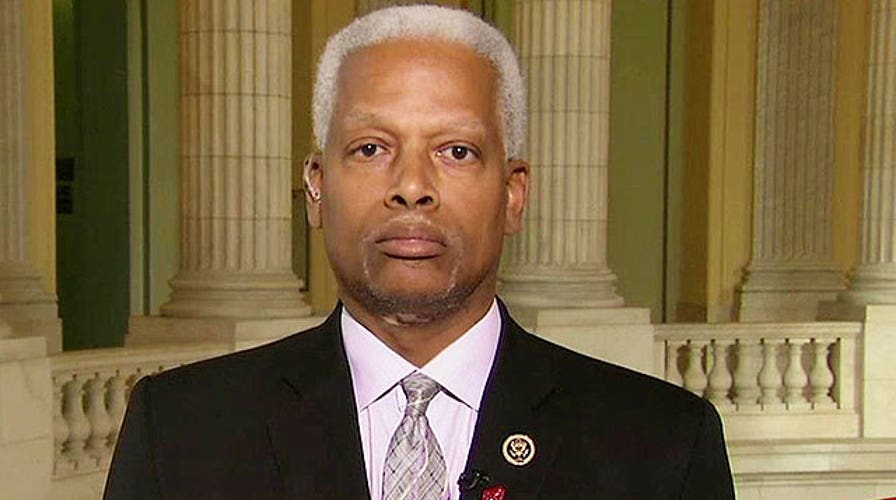Rep. Hank Johnson sounds off on race relations in America
Democratic congressman: 'It feels like open season on black men in America' on 'Hannity'
This is a rush transcript from "Hannity," April 15, 2015. This copy may not be in its final form and may be updated.
SEAN HANNITY, HOST: A Georgia Democratic congressman who has a history of making controversial comments about police practices in America made headlines earlier this week when he said this on the U.S. House floor.
(BEGIN VIDEO CLIP, APRIL 13)
REP. HANK JOHNSON, D-GA.: It feels like open season on black men in America, and I'm outraged. In fact, all Americans are at risk when bad actors in law enforcement use their guns instead of their heads.
(END VIDEO CLIP)
HANNITY: Here to explain his comments is the congressman you just saw in the video, Hank Johnson of Georgia. Congressman, good to see you. How are you, sir?
REP. HANK JOHNSON, D-GA.: I'm fine. Thank you for having me, Sean.
HANNITY: The latest year we have statistics for, do you know how many total deaths black, fatal fatalities caused by law enforcement, do you know how many they were?
JOHNSON: No, and that's a big problem, Sean.
HANNITY: I do have the number.
JOHNSON: We do not collect those figures --
HANNITY: Well I have the CDC --
JOHNSON: From all 18,000 jurisdiction that have police departments. It's about 400 deaths.
HANNITY: No. It's 123 deaths. The last year that we have, 2012, from the CDC. Do you know for 2013 the FBI, the latest statistics that we have murder statistics, black on black crime, do you know how many actual murders took place in 2013?
JOHNSON: Well, I tell you, this is a problem that we have in our society with crime --
HANNITY: But I'll give you the number. There's a big discrepancy.
JOHNSON: Part of it stems from hopelessness in our society, and a lot of what we do here in D.C. contributes to the sense of hopelessness in the black community.
HANNITY: So in 2012, the CDC says there was law enforcement killing or being involved in the fatality of black, black fatalities, 123, but black on black crime 2013 according to the FBI is 2,245. Your comments are against the police department and militarization.
JOHNSON: My comments --
HANNITY: Isn't it a bigger issue, black on black crime?
JOHNSON: Well, my comments about the unjustified killing of Mr. Scott in North Charleston, which you yourself condemned.
HANNITY: Absolutely.
JOHNSON: That's exactly what I was saying. I said it feels like there is open season on black males in America --
HANNITY: But I can't think of one other instance that is similar to that.
JOHNSON: You can't think of one other instance where there has been an unjustified killing --
HANNITY: Not like that. That looked like an assassination.
JOHNSON: Well, it doesn't get much more graphic than that. You're right about that.
HANNITY: But the Michael Brown case wasn't like that. The Trayvon Martin case wasn't like that.
JOHNSON: Well, I don't want to argue specific cases, Sean, but what we have seen is a revelation, a cascade of black males being killed under, at the hands of law enforcement.
HANNITY: Can you name one other example? I gave you the numbers, 123 total versus 2,245 black on black crime.
JOHNSON: Well, I can tell you that according to the Department of Justice figures for 2013, 420 deaths. And out of that 420 deaths, Sean, black males were four times as likely to face death after being taken into custody.
HANNITY: Congressman, I think we're on the same page here, but I don't think, I don't think -- there are some bad cops, that's one case that you've got right.
JOHNSON: There are.
HANNITY: Those numbers are dramatically lower than the incidents of black on black crime, and I believe every one of these kids, every one of these statistics, we need to save their lives. And I think we have a deal with the bigger part of the problem here, and the entire problem, you seem to only want to go after law enforcement. That's my only question.
JOHNSON: No, I want to get at the root cause of a culture that exists in the black community, a sense of hopelessness among inner city youth, those who don't see a sense of hope about the future. I want to change that. And I know that we can.
But on this issue of police brutality towards black males in this nation, I think that's something that we need to recognize, and that's also something that legislation can -- can help with.
HANNITY: I think unless we change the attitudes of everybody in this country and keep a vigilant eye and help these kids get out of impoverished neighborhoods and horrible public schools, I think that would be a good first step because we have to save those kids. Congressman, thanks for your time.
JOHNSON: Thank you, Sean.
Content and Programming Copyright 2015 Fox News Network, LLC. ALL RIGHTS RESERVED. Copyright 2015 CQ-Roll Call, Inc. All materials herein are protected by United States copyright law and may not be reproduced, distributed, transmitted, displayed, published or broadcast without the prior written permission of CQ-Roll Call. You may not alter or remove any trademark, copyright or other notice from copies of the content.

